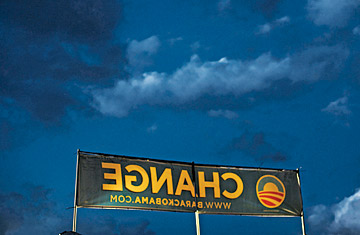
(2 of 5)
But the latest science suggests that yes, we can. Studies of all kinds of human frailties are revealing how to help people change — not only through mandates or financial incentives but also via subtler nudges that preserve our freedom to make choices while encouraging us to make better ones, from automatic-enrollment 401(k) plans that require us to opt out if we don't want to save for retirement to smart meters that warn us about how much energy we're using. These nudges can trigger huge changes; in a 2001 study, only 36% of women joined a 401(k) plan when they had to sign up for it, but when they had to opt out, 86% participated.
It's no coincidence that Obama's budget proposes an ambitious program of automatic-enrollment pensions for workplaces that don't offer 401(k)s or that his stimulus package has billions of dollars for smart meters. Behavioral science — especially the burgeoning field of behavioral economics that has been popularized by Freakonomics, The Wisdom of Crowds, Predictably Irrational, Nudge and Animal Spirits, which is the new must-read in Obamaworld — is already shaping dozens of Administration policies. "It really applies to all the big areas where we need change," says Obama budget director Peter Orszag. (See the top 10 nonfiction books of 2008.)
Orszag has been an unabashed behavioral geek ever since he read that 401(k) study. His deputy, Jeff Liebman of Harvard, is a noted behavioral economist, as are White House economic adviser Austan Goolsbee of the University of Chicago, Assistant Treasury Secretary nominee Alan Krueger of Princeton and several other key aides. Sunstein has been nominated to be Obama's regulatory czar. Even National Economic Council director Larry Summers has done work on behavioral finance. And Harvard economist Sendhil Mullainathan is organizing an outside network of behavioral experts to provide the Administration with policy ideas.
Obama has a community organizer's appreciation for human motivation, and his rhetoric often sounds as if it's straight out of a behavioral textbook. He has also read Nudge, which inspired him to pick his friend Sunstein — best known as a constitutional scholar — to run the Office of Information and Regulatory Affairs, the obscure but influential corner of the Office of Management and Budget where federal regulations are reviewed and rewritten. "Cass is one of the people in the Administration he knows best," says Thaler, the founder of behavioral economics and co-author of Nudge. "He knew what he was doing when he gave Cass that job." (See who's who in Obama's White House.)
The first sign of the behavioralist takeover surfaced on April 1, when Americans began receiving $116 billion worth of payroll-tax cuts from the stimulus package. Obama isn't sending us one-time rebate checks. Reason: his goal is to jump-start consumer spending, and research has shown we're more likely to save money rather than spend it when we get it in a big chunk. Instead, Obama made sure the tax cuts will be paid out through decreased withholding, so our regular paychecks will grow a bit and we'll be less likely to notice the windfall. The idea, an aide explains, is to manipulate us into spending the extra cash.
Obama's efforts to change us carry a clear political risk. Republicans already portray him as a nanny-state scold, an élitist Big Brother lecturing us about inflating our tires and reading to our kids. We elected a President, not a life coach, and we might not like elected officials' challenging our right to be couch potatoes. Obama's aides seem to favor nudges that preserve free choice over heavy-handed regulation, an approach Thaler and Sunstein, the co-authors of Nudge, call "libertarian paternalism." But it's still paternalism, and Sunstein will have the power to put it into action. The idea of public officials, even well-meaning ones, trying to engineer our private behavior to produce change can seem a bit creepy.
But face it: Obama is right. Our emissions are boiling the planet, and most of our energy use is unnecessary. Our health expenditures are bankrupting the Treasury, and most of our visits to the doctor can be traced to unhealthy behavior. We do need to change, and we know it.
So why don't we? And how can we? The behaviorists have ideas, and the Administration is listening.
See pictures of the civil rights movement, from Emmett Till to Barack Obama.
